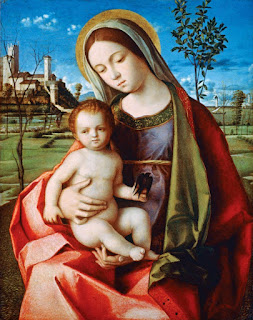I remember reading as a teen a very detailed newspaper
article on how the date of December 25 as the birthday of Christ was a Medieval
tradition. That is, there was some kind of important pagan celebration around
the time of the winter solstice, and the church simply tacked the celebration
of Christ’s birth onto that as a way of coopting the pagans.
But it is well established that the church began using
December 25 as the birth of Christ a little after the year 300. This was well
before the Medieval period. So what was all that stuff about the date coming
from a Medieval tradition?
It was simply stuff and nonsense. Anyone who spent a half
hour in an average public library would realize the tradition was ancient, not
Medieval. Looking back on the matter, the article was as a subtle attack on
Christianity. That is, if the central truths of the faith are just Christianized
versions of pagan religions, there is nothing special or uniquely true about
Christianity. But the facts were made up.
And the attack would not work, anyway. Christmas may be a highly
visible part of Christian practice, but it is not a part of Christian belief.
That is, the Bible does not give us a date for Christ’s birth, so
deconstructing December 25 does not touch the substance of Christianity.
Now that the knowledge that December 25 is an ancient
tradition is widespread, the attempt to deconstruct the date takes a different
but familiar angle. The ancient Romans had a festival called Saturnalia around
the same time. It originally started on December 17 and later expanded through
December 23. So we are assured that the church made up the date of December 25
to coopt the pagan celebration.
Obviously, that is not a match. If these people who want to assert
a cynical motive for celebrating on December 25 are going to have the attitude
that “close” counts, they ruin their own argument. The Romans had so many
feasts and holy days, one could almost choose a date at random and either match
one of those dates or be close. The argument defeats itself.
More importantly, there are no ancient Christian writings
that said, “The Romans are being gluttons, drunkards, and gamblers during
Saturnalia, so let us say that Christ was born close to one of those days,
because that will help us convert people to Christianity.” Nothing even close.
The church at that time had their own reason for choosing
that date, and it sounds odd to modern ears. They decided that a martyr died on
the date of his conception. After making a nice calculation for Easter in the
relevant year, they added nine months and came up with December 25.
If you want to say this sounds as odd as the Medieval winter
solstice and the Roman Saturnalia stories, go ahead. But this was based on what
some early Christians believed, not made-up stories of Christians trying to
take pagan celebrations and making them their own.
A more biblical/historical method involves noting that Jesus
was conceived six months after John the Baptist was, and that John the Baptist
was conceived right after his father performed a certain priestly ceremony, as
recorded in the Gospel according to Luke. Historians then try to figure out
when that father’s priestly division was on duty. They tie this together and
come up with Jesus being born in December.
However, that historical calculation can be and has been
disputed, so we are left with no certain answer.
But, as was stated above, disputes about the date of the
birth of Christ do not strike at the Christian faith. Christians tend to be
comfortable celebrating Jesus’ birth on December 25. But it has nothing to do
with a cynical ploy on the part of the church to tag along with pagan
celebrations. The cynicism is in the minds of people who make such assertions,
weak and baseless as they are.

No comments:
Post a Comment